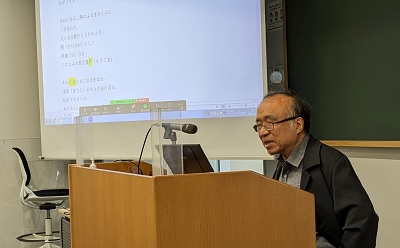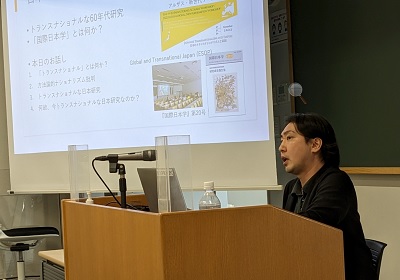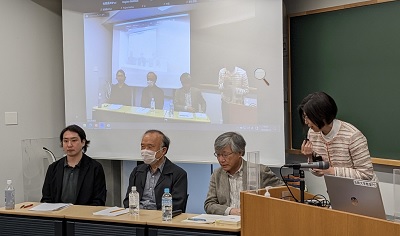Transnational Japan Seminar at HIJAS Kokusai Nihongaku and Transnatioanlism: Grasping Japan through Transcending Japan (June 24th、2023 )2023/07/18
Transnational Japan Seminar at HIJAS
Kokusai Nihongaku and Transnatioanlism:
Grasping Japan through Transcending Japan
■ Date: June 24th (Sat.) 2023, 14:00 ~ 17:30
■ Location: Hosei University Ichigaya Campus, Ouchiyama Building, Room Y 703
■ Presenters:
– Shin Abiko (Hosei University)
“From International to Transnational”
– Kei Takata (Hosei University)
“What is Transnational Japanese Studies?”
■ Chair: Yasuko Yokoyama (Hosei University)
■ Commentators:
– Tsutomu Hoshino (Hosei University)
– Takami Kuwayama (Kwanseigakuin University)
More than 20 years have passed since the Kokusai Nihongaku(国際日本学)program was launched, and both “Kokusai” and “Nihon” have undergone various changes since then. The speed of people and information mobility has increased dramatically, and our world has become much more fluid and diverse. In this workshop, Shin Abiko and Kei Takata made presentations with the aim of exploring new ideas of “Kokusai Nihongaku” while reflecting on the past activities of the research institute, HIJAS. The keyword for the workshop is “transnational,” which has also been the theme of conferences held jointly by HIJAS and the European Center for Japanese Studies in Alsace (CEEJA) over the past few years with support from the Consortium for Global Japanese Studies (CGJS). Workshops “Japanese Studies and Transnationalism” in 2021 and “Japanese Transnationalism and Empire” in 2022 featured a variety of fascinating empirical studies, theories, and methodologies related to Japanese transnationalism. However, since these workshops were held mainly in English in France, this time, we decided to organize an event that explores the possibilities of transnational Japanese studies in Tokyo using the Japanese language.
The first speaker, Shin Abiko, professor emeritus at Hosei University, gave a lecture titled “From International to Transnational.” Based on his long experience at the research institute, Abiko explained the idea of “Kokusai Nihongaku” that the HIJAS has had since its inception. The idea aimed to open up the field of Japanese studies that were generally closed within the respective national setting. By creating spaces to discuss Japan collectively between Japanese scholars and foreign scholars, Kokusai Nihongaku attempted to bring new insights into Japanese studies that both sides of the participants were unaware of. According to Abiko, the perspective of “openness” is extremely important for Kokusai Nihongaku, and he discussed this point by referring to the French philosopher Henri Bergson’s ideas of “closed society” and “open society.” In contrast to a “closed society,” which is self-preserving and hostile toward the outside, an “open society” is a society that embraces all human beings without being confined to a “nation” and intermittently “reconstructs” individual identities. Abiko linked Bergson’s argument to the concept of international, global, and transnational and argued that the transnational is the only concept that fully embodies an “open” society that breaks away from the “closed” national society. Hence, Abiko’s presentation conceptually explained the significance of “transnational” Japanese studies as an approach to further “open up” the traditional Kokusai (= international) Nihongaku.

Shin Abiko (Professor Emeritus Hosei Unviersity)
The second presentation by Kei Takata was entitled “What is Transnational Japanese Studies?” In the humanities and social sciences, research from a transnational perspective has been prevailing for the past 20 years, and in recent years, area studies also began to take this approach. However, a transnational approach that relativizes the nation-state framework can severely challenge the core identity of area studies since the nation-state is the basis of the field. Then, how is it possible to analyze area studies from a transnational perspective while maintaining the identity of this academic field? In response to this question, Takata argues that, rather than evading nation-states from its analysis, as has been seen in many existing transnational research, it is crucial to “bring nation-states back into transnational studies.” Nation-states have been and remain a powerful institution that promotes and restricts transnational mobility. Thus, through the analysis of transnational mobility and its effects, we will be able to shed light on the characteristics of the Japanese nation-state that cannot be seen only by analyzing domestically. Takata also mentioned that behind the emergence of “transnational Japanese studies,” there seems to be a demand from Japanese society to seek a new identity that can cope with accelerating transnational change.

Kei Takata (Associate Professor Hosei Unviersity)
After the two presentations, philosopher Tsutomu Hoshino and cultural anthropologist Takami Kuwayama gave comments and questions. Hoshino pointed out that the relationship between “Kokusai” and “Nihon” has been repeatedly discussed since the establishment of the Kokusai Nihongaku program. He then raised two important perspectives that can be deepened by transnational Japanese studies – multiculturalism and transnational identity. Hoshino concluded by referring to political philosopher Masao Maruyama’s concept of “basso ostinato (執拗低音) “ and “kosō (古層)” and asked how transnational Japanese studies can answer the cause and reasons for the uniqueness of Japanese thought, which Maruyama himself could not fully explain.
Kuwayama first expressed his support for Takata’s message of “bringing nation-state back into transnational studies” and proposed publishing an edited volume on this topic. Furthermore, he made several valuable comments from an anthropological perspective on the concept of transnationalism. First, the Japanese translation of “nation” includes not only “Kokumin (people of the nation)” but also “Minzoku (ethnicity),” and the question was posed as to what it means to “transcend ethnicity” in transnational studies. In addition, in light of the recent situation where online transnational practices have become common, it is now crucial to reexamine the concept of “body” in transnational experiences. He also raised several more points, such as the relationship between the theory of transnationalism and cosmopolitanism, which were all important while considering the future direction of transnational Japanese studies.
The questions posed by the two commentators were diverse and complex, and they could not be answered easily within the limited time of the workshop. “Transnational Japanese studies” has only just begun, and we need to continue to deepen our consideration while keeping in mind the points discussed in the workshop. Yet, what needs to be taken out from this workshop is to shed light on transnational Japan from various perspectives across the humanities and social sciences, and in doing so, researchers themselves need to move transnationally and “open” themselves to the broader world.

From the left
Kei Takata (HIJAS Full-Time Researcher)
Shin Abiko (HIJAS Visiting Researcher)
Tsutomu Hoshino (HIJAS Visiting Researcher)
Yasuko Yokoyama (HIJAS Director)
The papers presented (in Japanese) are available below.
Shin Abiko “From International to Transnational”
Kei Takata “Toward Transnational Japanese Studies”
【Kei Takata (Hosei University)】

